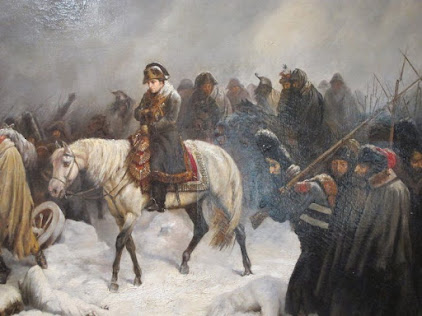An image of the "March on Rome" of the Fascist blackshirts that took place a hundred years ago, in October 1922, and that brought Benito Mussolini to power in Italy. Look at him at the center of the photo: he already looked like an actor playing a role on stage, the strong man with a square jawline. It was a posture and a mask that he would maintain unaltered for more than 20 years as absolute ruler of Italy. That mask would eventually become him and devour him, taking him to his doom. Today, there doesn't seem to be any more space for such macho dictators, but totalitarianism is not gone, it is taking different forms.

On July 25, 1943, the leader of the Italian government, Benito Mussolini, was arrested on orders from the King of Italy. That day, my grandfather was on vacation with his family on the hills. Coming back home by train, he walked out of the station without having read the newspapers of the day, so he was still wearing his Fascist party badge. Someone told him that it was not a good idea, but he refused to take it off and, for a few days, he stubbornly insisted on wearing it. It took several days before he was forced to realize that
the days of Fascism were over. I am telling you this story to show you that Fascism in Italy was not something imposed by jack-booted thugs wearing black shirts. My grandfather, surely, was not one: I remember him as a kind man who loved children. But, during its heydays,
Fascism was a truly totalitarian phenomenon. It permeated every facet of life: at school, at work, in the family, everything. And it was diffuse in all social classes: from the nobility to the workers. But what was it, exactly? An idea? A political party? A person? A hallucination? Or what?
Fascists saluted each other by outstretching their right hands in the "Roman Salute," which the Ancient Romans never used. They would recognize the "fascio" as a symbol of unity, a meaning that it probably never had in Roman times. They claimed to have rebuilt the Roman Empire by conquering a country, Ethiopia, that newer was part of the ancient Roman Empire. They shared with each other some typical ideas, such as nationalism, racism, the idea of self-sacrifice ("me ne frego,") and a love for uniforms and military parades. In terms of policies, Fascism was a mix of socialism, nationalism, paternalism, imperialism, and more, often in contradiction with each other. It could be anything, but, in practice, it was mainly one thing: Benito Mussolini himself, the Duce degli Italiani, the absolute ruler of Italy.
During the Fascism age, the propaganda machine of the Fascist party ran unopposed and saturated the Italians' worldview. The power of the Duce grew so much that it probably went beyond the expectations of his sponsors, and perhaps of Mussolini himself. It became a common slogan that "Mussolini ha sempre ragione" (Mussolini is always right), and he would bask in public ceremonies where he was revered by "oceanic crowds". The Italian people had completely delegated to him all powers. They had regressed to the role of children obeying the orders of their stern father. Mark Oshinkie correctly described this phenomenon as follows (not referred to Italian Fascism, but valid for it, too),
Overall, per Jean Piaget, they thought like eight-year-olds. And as did Cub Scouts, they exhibited a pack mentality: the dysfunctional kind.
This image (author unknown) nicely summarizes the essence of Fascism, just as of all forms of totalitarianism:

How could it happen that so much power was bestowed on a single man? In part, Mussolini's success was due to sheer luck, but also to his capability to bluff, and his willingness of catching a good opportunity when it appeared. More than all, he was a master of propaganda, one of the first politicians in history to use the new mass media -- the press, movies, and the radio -- for self-promotion. As a politician, Mussolini knew even too well that all politics is based on finding someone to blame. And he was selling to his sponsor the idea to deflect the rage of the working class to foreign targets, away from the Italian elites. Pivoting on a series of myths that were already diffuse at that time, he blamed the troubles of Italy on the decadent Northern Plutocracies, the evil Soviet Communists, and the inferior African races. In this way, he managed to obtain support from those sectors of Italian society which had been fighting each other before Fascism: the workers, the financial sector, the industrial sector, the military, the intellectuals, and the King of Italy himself.
But Mussolini was not just a politician. He was a great salesman, too, one of those people who don't just sell things, they sell dreams. He sold to Italians the dream of a new Roman Empire and that they, the descendants of the ancient Romans, would be the new masters of the world. And Italians bought that dream enthusiastically. For 20 years, Italy saw a wave of Roman symbols, banners, fascis, people dressed in togas, and speeches about the new Empire. If you visit Rome today, you can still see four maps of the expansion of the Roman Empire on the wall of the ancient Forum, placed there in 1934. A fifth map, now removed, depicted the modern Italian conquest of Libya and Ethiopia. Was it a political program? If it was, it failed miserably. But at the time, evidently, it looked like a good idea.

For some 20 years, the Duce was Italy, and Italy was the Duce. You could say that he was playing the mythical role of the "Sacred King," concentrating on himself the glory and the responsibility for all that was happening, good and bad. And everything that happened was written in the Celestial Gantt Charts, up in the sky. Glory is a harsh mistress, and no man can keep his mind sane for a long time while staying at the top, surrounded only by adulators and sycophants. By the late 1930s, Mussolini had become a caricature of himself: his mask of strong-jawed man had devoured him, turning him into a bumbling fool who had lost contact with reality, and who threw Italy into a series of absurd wars that ended with a humiliating defeat. Mussolini played the role of the sacred king up to the end, when, in 1945, he was ritually sacrificed, atoning with his death the atrocities committed in his name.
And now, about our times: can Fascism return? And if so, in which form? Clearly, humans have a fascination for strong leaders and, today, Western media are quick to label a foreign leader as a "dictator" or a "new Hitler." But few modern leaders seem to be able to approach the level of power that Mussolini had. Our "color revolutions" borrow some elements that Mussolini pioneered with his March on Rome, but they are a different thing, piloted by foreign powers and designed to create chaos. In 2020, Donald Trump may have tried something like a "March on Washington," but his militia, despite including a propitiatory horned shaman, turned out to be pitifully ineffective.
Should we conclude that the age of Fascism is over? Maybe it is, at least in the aggressive form that it had assumed with Mussolini and his imitators. But totalitarianism, surely, is not over. On the contrary, it is on the increase. We see it very well with the current rise of censorship, groupthink, propaganda, control, encroaching on personal freedom, and more. But all that is arriving without the presence of a "great leader," at the top. What's happening?
I think that
Simon Sheridan has a key observation, here. In examining the Covid story, he interprets it in terms of the
"devouring mother" -- an archetype that goes in parallel with that of the sacred king, but that's different in many ways.
From Sheridan's site:
Drawing on the work of the great Swiss psychologist, Carl Jung, Sheridan makes the case that the archetype that has been dominant in the west for several decades is The Devouring Mother, a shadow form whose primary qualities include gaslighting, emotional manipulation and guilt tripping all in the name of protecting her children. Sheridan switches between the microcosmic and the macrocosmic to show how The Devouring Mother permeates all levels of society from interpersonal relationships and employment through to large scale political and social movements including corona.
So,
the West may have experienced an "archetype switch" during the second half of the 20th century, when propaganda moved from promoting the rule of dominating fathers (or sacred kings) to that of devouring mothers, also known as "castrating mothers." Sheridan's idea makes a lot of sense. When the corona pandemic appeared, no strong leader emerged with the promise of bombing the evil virus to submission. On the contrary, the strong man of 2020, Donald Trump, was positively damaged by his attitude that many perceived as callous and uncaring. At most, we saw the emergence of suave grandfatherly figures, such as
Tony Fauci, who adopted gaslighting as his main communication tool. And "Science" took the role of the devouring mother.
There is a logic in this archetype switch. A sacred king is a real person, while the devouring mother is an abstraction. From the viewpoint of the elites, an abstract archetype is much better. "Science" can be easily controlled by corrupting those who speak for it, the scientists. Instead, a great leader can hardly be corrupted: he has all the power, and so he can have everything he wants. Another advantage of having raised science to a god-like role is that if (when) things start going bad, politicians and officials can reasonably hope to be able to get off the hook (in a literal sense), by blaming the scientists for having misled them. Mussolini was hanged upside down, but you cannot hang science. That does not prevent the possibility that individual scientists will be hanged, just like the Nazis at Nuremberg. But the elites don't care about scientists.
These phenomena are another step in the evolution of the communication technology we call "propaganda." It had its infancy in the 19th century, matured with the dictatorships of the 20th century, and is still growing and morphing into new forms that, sometimes, we have difficulties recognizing and understanding. In any case, technology is power, and the problem of power is control.
The modern forms of propaganda are immensely powerful, even near divine if we see them as ways of "creating reality" -- once a prerogative of God alone. But whereas God is benevolent and merciful, propaganda definitely is not. Its main tool is hate, and it uses it with glee to exterminate huge numbers of people.
The Covid propaganda campaign had started with a theoretically benevolent purpose: saving grandma from the threat of a deadly virus. And yet, it soon became a hate campaign against the evil "no-vaxxers." It may well be that the people who started the campaign were surprised themselves by how the small creature called "coronavirus" had been turned into a Chthonic deity, just as those who supported Mussolini were surprised to see him turning into a sacred king. Fortunately, the Covid story is clearly losing its grip on people's minds. Perhaps it is being suppressed by the same entities who created it, not wanting to lose control of their creature. For the time being, they have returned to the old and tested methods of hate-mongering, as we see in the current demonization campaign against the Russians.
So, have we reached "peak propaganda"? Maybe, but it may also be that we'll see it morphing into something new and more sophisticated. The new creature called "Metaverse" may offer new avenues for the powers that be to control their subjects. But history always goes in cycles, old ideas come back and disappear, always the same and always different. In a century or so, we saw dictators take the shape of ancient sacred kings, the evil dragoness Tiamat reappearing as a minuscule peduncled creature, human sacrifices performed on an immense scale, and, recently, nearly all the churches of God worshiping a golden calf called "Science." What else are we going to see?
In the end, it is the human mind that creates myths, gods, and monsters. It is keeps them alive, and gives them the power to harm people. Propaganda is just an amplifier of these powers -- evil is all in the mind of the believer. You have to resist this evil, and you can if you remember that reality is not what appears in TV or in the media. Reality is what you see and what you touch. It is your friends, your family, your partner, your children. It is the ground you touch, the flowers you see, the singing of birds. Just stay human, and Fascism will never return.
















